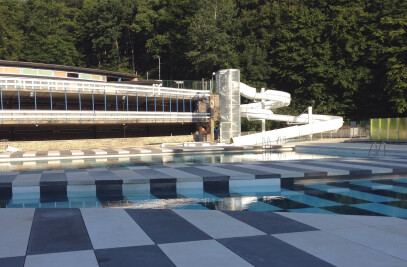You cannot speak about the Vector without speaking about the city of Charleroi. You cannot speak about the city of Charleroi without speaking about the Vector. This evolving city is the theatre of architectural and urbanism projects which have the ambition to radically change its way of working, its image and also its nature.If some of those projects were polished in a detached way, like separated points in a city, other projects have the ambition to make connections. Connections which bind to the others become lines which are spread like a dynamic network. The giant urban painting which recovers the entirety of the facades of the Vector, from the street of Marcinelle to the street Navez, is not just a decorative gesture but a structured reflexion on a building of cultural use in relation with the neighborhood and its inhabitants. It is the atmosphere of the street which has changed. With its old frontage, everyone knew the Vector, with this urbain painting; everyone knows now where the Vector is. It became an urban reference of the city center with which the neighbors interact. Object of curiosity for some of them, cultural place of living for the others, the Vector, with this new facade, translate its intellective cultural program but also reflects recreation and escape. It is in the universe of the naval war and the art of camouflage that we draw one of the major reference of the frontage. During the First World War, English and American armies invented a technique of camouflage for their boats called “Dazzle Painting”. The fresco applied to the facades of the Vector is impregnated with the geometrical and graphic principles of “Dazzle Painting” not in order to hide the building but to permanently modify its form. Following the example of these boats, we opt, in an artistic way, to intervene on all the surfaces of the facades: masonry, stone, aluminum, PVC, wood and even glass were not forgotten. It was essential that the artistic intervention recovers large surfaces but also down to the smallest detail. To work, the project has to be radical.
Products Behind Projects
Product Spotlight
News

Fernanda Canales designs tranquil “House for the Elderly” in Sonora, Mexico
Mexican architecture studio Fernanda Canales has designed a semi-open, circular community center for... More

Australia’s first solar-powered façade completed in Melbourne
Located in Melbourne, 550 Spencer is the first building in Australia to generate its own electricity... More

SPPARC completes restoration of former Victorian-era Army & Navy Cooperative Society warehouse
In the heart of Westminster, London, the London-based architectural studio SPPARC has restored and r... More

Green patination on Kyoto coffee stand is brought about using soy sauce and chemicals
Ryohei Tanaka of Japanese architectural firm G Architects Studio designed a bijou coffee stand in Ky... More

New building in Montreal by MU Architecture tells a tale of two facades
In Montreal, Quebec, Le Petit Laurent is a newly constructed residential and commercial building tha... More

RAMSA completes Georgetown University's McCourt School of Policy, featuring unique installations by Maya Lin
Located on Georgetown University's downtown Capital Campus, the McCourt School of Policy by Robert A... More

MVRDV-designed clubhouse in shipping container supports refugees through the power of sport
MVRDV has designed a modular and multi-functional sports club in a shipping container for Amsterdam-... More

Archello Awards 2025 expands with 'Unbuilt' project awards categories
Archello is excited to introduce a new set of twelve 'Unbuilt' project awards for the Archello Award... More

























